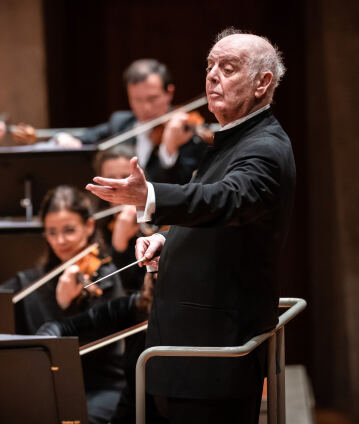Daniel Barenboim conducts Fauré and Franck

At the end of the 19th century, people were greatly moved by the tragic story of Pelléas and Mélisande. Maurice Maeterlinck’s symbolist drama about secret love and fatal jealousy inspired Gabriel Fauré to write incidental music that brings the mood of the material to life. As the main work of the evening, Daniel Barenboim conducts César Franck’s Symphony in D minor – music that blends Beethovenian spirit with French elegance.
The path to recognition could be rocky in turn-of-the-century Paris – as both Gabriel Fauré and César Franck found out. At the age of 60, Fauré was not only a seasoned church musician who had already held important posts: his supporters included his former teacher and friend Camille Saint-Saëns, one of the most influential artists in France. And yet: when Fauré took over as director of the Paris Conservatoire in 1905, it provoked a scandal – because he had not studied there but at the École Niedermeyer.
Fauré’s suite Pelléas et Mélisande, written a few years earlier, is based on the incidental music the composer wrote for an English performance of Maurice Maeterlinck’s drama. Full of tonal finesse, Fauré traces scenes from the plot, whose tragedy is already echoed in the delicately orchestrated prelude: Golaud encounters the mysterious Mélisande while hunting. He marries her and takes her to the gloomy castle where Golaud’s half-brother Pelléas also lives. When love develops between Pelléas and Mélisande, Golaud kills his half-brother out of jealousy. After Mélisande gives birth to Golaud’s child, she also dies.
When trying to find an opportunity to perform his symphony, César Franck – like Hector Berlioz, by the way – came to recognise that if you wanted to be someone in Paris, you had to write operas. It was only thanks to Franck’s perseverance that his Symphony in D minor was premiered – and it disappointed. Franck’s contemporaries hated the unusual form and the rich, Wagner-inspired harmonies. The symphony uses only a few themes, which are constantly transformed, and the constant alternation between fast and slow sections subverts the traditional movement character. Today, Franck’s only symphony is one of the most important French contributions to the genre – quality prevails, even if recognition only comes later.
© 2023 Berlin Phil Media GmbH